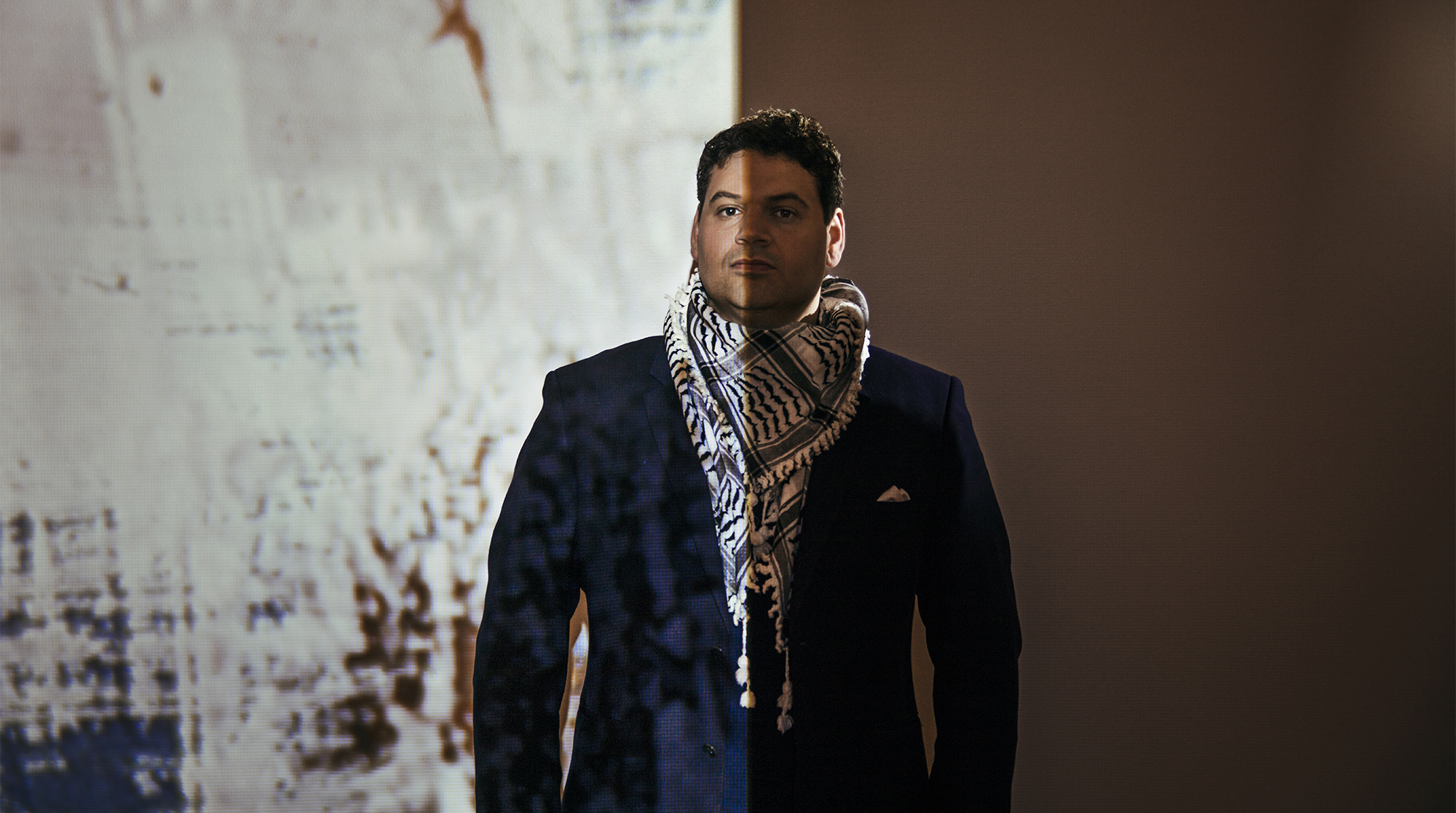

I need to go to bed sooner. My roommate took my last Red Bull, so I’m stopping at Suzzallo for coffee before class. When you’re running late for a lecture in Kane Hall, you should always go through the back door. Otherwise you have to walk right by the professor.
That’s the mistake I made on the first day of Introduction to American Politics, the class I’m headed to now. I was five minutes late and I walked through the front door, right past Professor Megan Ming Francis. “If you don’t want to be here,” Professor Francis said as she looked down at her computer, “feel free to drop the class. There are plenty of people who would love to take your place.” I‘m still not sure if she was talking about me.
I’d heard a lot of good stuff about Professor Francis. “Tough, but really fun,” my friend said. I follow her on Twitter and saw that she’s a fellow at the Thurgood Marshall Institute, which is part of the NAACP Legal Defense Fund. I’m thinking about law school, so it will be great to know her. And I don’t just want a letter of rec, I really want to learn this stuff. But a letter of rec would be great.
OK, here we are—Kane 210. I’m slipping in the back door. Today we’re talking about “I’ve Been to the Mountaintop,” the speech Martin Luther King gave the day before he was killed. We were supposed to read it, but I listened to it on YouTube. This is my favorite line: “All we say to America is, ‘Be true to what you said on paper.’” This class is about what America said on paper, what America promised. And MLK says that the promise hasn’t been kept.
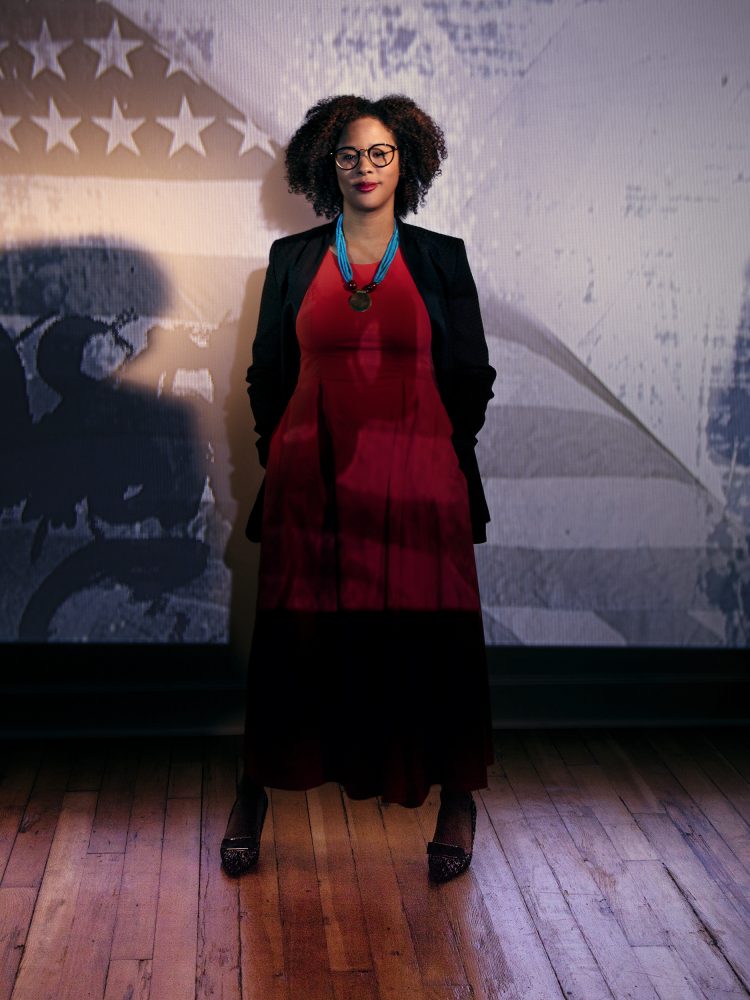
Megan Ming Francis, associate professor in the Department of Political Science.
It’s funny to see the way Professor Francis teaches this stuff compared to how MLK talks about it. He’s slow and steady with dramatic pauses. She moves around and waves her hands and talks fast.
This is our second day on the Civil Rights era. Professor Francis, who is half-Black and half-Chinese, is telling us why the court cases from that time period are so important. “Do y’all see me? It’s possible for me to be your professor because of the legal precedent laid down in cases like Brown v. Board of Education.”
Two hours fly by with a professor like that. Now I have a 20-minute walk to the Fishery Sciences Building, down by Portage Bay, for Biology of Shellfishes with Professor Chelsea Wood. It’s a pretty tough class because we have to memorize a bunch of Latin words, but we also get to watch videos of animals hunting. Did you know a starfish is a predator? They have tubes on their feet and a mouth on the bottom of their body, and they crawl around and suck up their prey.
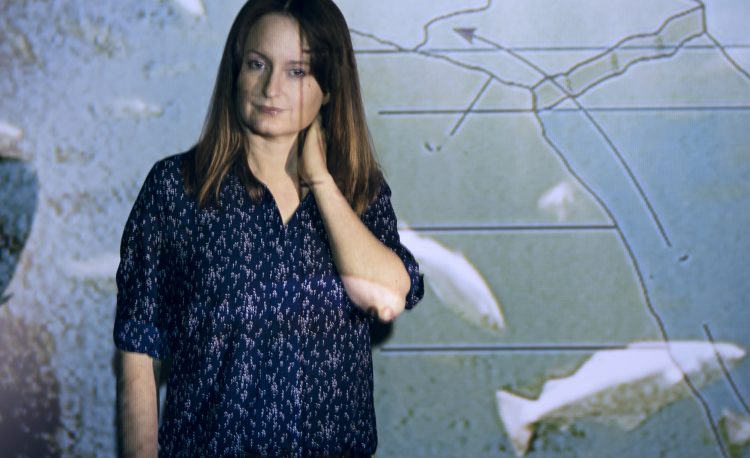
Chelsea Wood, assistant professor in the School of Aquatic & Fishery Sciences.
Professor Wood starts today’s lecture with a story from her grad school days. She sailed for a week straight to get to a remote island with a research group. One day they were wading through shallow water, and she warned her students that the area was full of tiger sharks. All of a sudden, something latched onto her foot. “The horrified students stood behind me, probably wondering, ‘How do we get back to the boat? Should we bring her body with us?’”
Professor Wood clicks her laptop to reveal a picture of a stretched-out tentacle, which kind of looks like an octopus. “This is what attacked me. I was attacked… by a sea cucumber!” The kid next to me gasps. “They can liquify themselves on command,” Professor Wood says, “because they have mutable connective tissues. Those tissues liquify when a threat approaches and then re-solidify when it’s safe. Now you will never forget what mutable connective tissue is.”
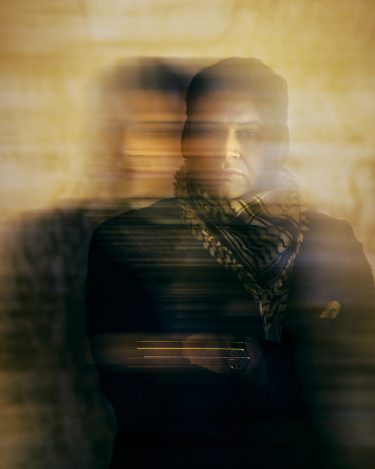
Karam Dana, associate professor in the School of Interdisciplinary Sciences at UW Bothell.
Alright, two classes down. Now I have to catch a bus to Bothell. It’s 12:20, and I have a 1:15 class on the UWB campus. Each quarter I can take one class at a different UW campus, so I signed up for Politics of the Middle East with Professor Karam Dana. One of my friends told me that this class changed his life. But he also said Coachella changed his life. I mostly signed up for the class because Professor Dana has great reviews on RateMyProfessors.com.
The bus took forever today. I’m ten minutes late, and this isn’t a big class, so Professor Dana will definitely notice. I’m going through the back door anyway. “You’re late,” he says as soon as I walk in. “The rule is, if you come in late, you give me a compliment.” I tell him I like his shirt. He nods. “In about 10 days, Ramadan will start. I probably won’t be as friendly as I am now. It gets harder the older I get.”
Professor Dana has a booming presence. He knows everybody’s name and he calls on you even if you don’t raise your hand. Today we’re talking about migration. Professor Dana asks each of us to think about what it’s like for us when we cross a border—what advantages and disadvantages come with our identities? “Hell, I’m Palestinian,” he says. “I have a very complicated relationship with borders.”
We’re talking about Israel and Palestine for the next two weeks of class, and pretty much everyone in here has an opinion about it. “I want you guys to stretch your thinking, to recognize your own biases, to go beyond the typical media coverage,” Professor Dana says. “How can we think creatively about peaceful and democratic coexistence?”
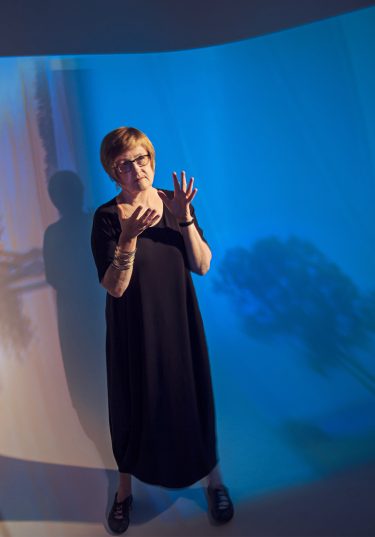
Jane Van Galen, the winner of the DTA Innovation with Technology Award, is a professor in UW Bothell’s School of Educational Studies.
I’m grabbing coffee before I take the 372 back to Seattle. I have six minutes before the next bus and there are five people ahead of me in line. The woman behind me looks like she’s in a hurry, too. I tell her we must have come at the wrong time. She says she’s using the downtime to change her Twitter username, because she applied for a research grant on Twitter, and the grant makes you put your full name on your profile.
It turns out she’s an education professor who teaches a storytelling workshop, and her students use iPads to tell multimedia stories about their lives.
I tell her I mostly use Instagram, and that it usually feels like I’m mindlessly scrolling. She says I should take control of my digital identity. “Digital identity… like my brand?” I ask. She says to think about it less as marketing, and more as being civic-minded. “You’re not selling yourself. You’re not the product,” she says. “It’s about how you can contribute, what you have to offer, and who you want to connect with.” I tell her I’d love to take her workshop. “In the meantime, you can find me on Twitter,” she says as the barista hands me my coffee. “It’s @jvg, for Jane Van Galen.”
I had to run to catch the bus. The driver looked annoyed. I need to call my mom when I get home, then I’m heading to the Ave. Some friends are meeting for dinner, and then I’m doing homework at TeaRepublik. I have so much reading due tomorrow. I’m starting to wonder if I took too many classes this quarter.
I’ll just lie here a couple minutes. My first class is at 9:30 on Tuesdays, which means I can sleep an extra 30 minutes. But last night I stayed up 45 minutes later than usual, so I actually lost sleep. I never made it to TeaRepublik.
It’s nice living off-campus. I lived in McMahon last year. There was a dining hall downstairs and one week I ate spaghetti for every meal. For a few months the kid living next to me kept a baby anaconda in a box under his bed, because the fraternity he wanted to join said he had to. This year I have an apartment just north of 45th Street, near Greek Row, so that kid is still my neighbor. I don’t know what happened to the snake.
I only had to walk 10 minutes to my first class today, Social Problems with Professor Alexes Harris. There’s a full house, 300 people. We have an exam this week, so even the slackers showed up. We spend the first 15 minutes reviewing sociology theories. “Now, let’s bring it all together by listening to our urban sociologists,” Professor Harris says. She pulls up YouTube and plays the song “Changes” by Tupac.

Alexes Harris, professor in the Department of Sociology.
When the song is over, she asks how many social problems we can identify. “A lot!” someone shouts. “Differential access,” another student says, “because he doesn’t have food. He says, ‘My stomach hurts so I’m looking for a purse to snatch.’” Professor Harris nods. “Raise your hand if you think Tupac is a structural functionalist,” she asks. A few people raise their hands, but I don’t. “What about a conflict theorist?” The people in the front row raise their hands, so I do. You wouldn’t sit in the front row if you didn’t do the reading.
Our assignment for next week is to find a song that’s about social problems and then about it. “It can be old or new songs,” Professor Harris says. “I’ve gotten Willie Nelson before. I don’t want you to ever listen to music the same again.”
I’ve got two hours before my next class. I need to stop by the Ave to grab a book, and a snack. I always walk by this Wells Fargo because I love hearing this man who sings on the corner: “Don’t know much about history… Don’t know much biology… Don’t know much—what a wonderful world this could be.” When he forgets the words he goes back to the chorus. A few months ago I gave him $5 because he let me record him singing a song for my dad’s birthday.
I’m on the second floor of the Book Store, in the fiction section, and I’ve got the book I was after. There’s a woman next to me with some really cool tattoos. I’ve thought about getting one, but I can’t decide what I want. This woman has hummingbirds, three of them fluttering down her right shoulder. “Excuse me,” I can’t help but say, “I really like your tattoos.” She turns and thanks me with a bright smile. I ask her if the hummingbirds have any significance. “In my tribe, the Puyallup, hummingbirds represent rebirth. If you see a hummingbird, it means something good is about to happen. I have three kids, so I got three hummingbirds.”
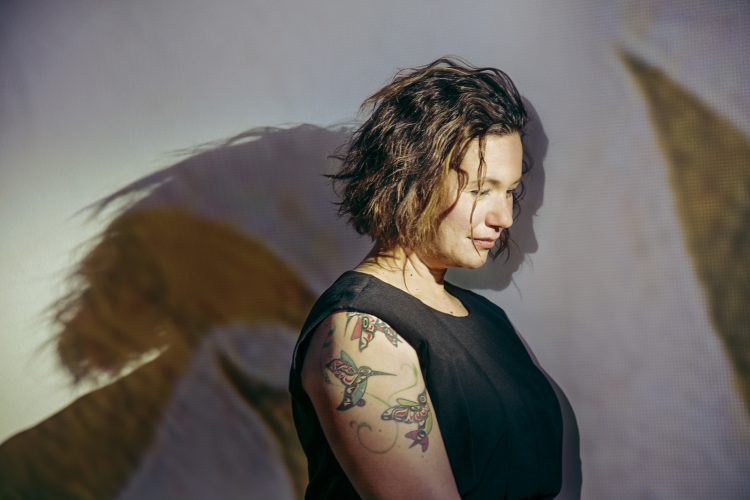
Danica Miller, assistant professor in the School of Interdisciplinary Arts and Sciences at UW Tacoma.
She tells me her name is Danica Miller, a professor at UW Tacoma. We’re both heading to the Book Store Cafe on our way out, so we decide to sit and chat for a few minutes. Professor Miller grew up on the Puyallup Reservation and moved to New York City for grad school. She got a few degrees in English and even dressed up like a mermaid every year for a parade on Coney Island.
I ask her about the book she bought. It’s called Cogewea, The Half Blood. She says it’s considered the first novel written by a Native American woman, a Northwest author named Mourning Dove, who picked apples in the field during the day and wrote the book in her tent at night. “It’s a love story about two mixed-blood Indians,” Professor Miller says. “Mourning Dove subverts this typical frontier text, the dime-store novel, and makes it very indigenous.”
Wow, I don’t know how there’s not a movie about Mourning Dove. Professor Miller teaches with these kinds of books as a way to show what native communities have to deal with because of colonization. I admit to her that I don’t know much about the history of colonization. She understands, but she corrects me: “We are in a state of colonization. This is a contemporary active state. These books address bad things happening in our communities, and they make the link between these things and colonization. Without that link, there’s a sense that it’s our fault.”
Now I need to get to the Quad. I have a class in Smith Hall. There are two ways you can get from the Ave to the Quad: by the Burke Museum and past the business school, or down by Parrington Lawn and behind Kane Hall. One time a business school professor told me the fastest way through campus is taking diagonal routes, not 90-degree angles. That would mean the better route goes by the business school. So he could be biased.
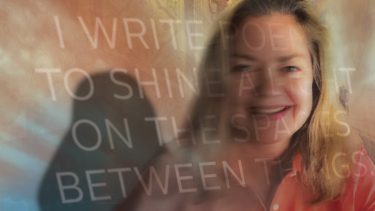
Frances McCue, senior lecturer in the Department of English.
That book I got from the Book Store? It’s a collection of short stories by Raymond Carver. My next class, in Smith, is Reading Fiction of the Pacific Northwest. It’s taught by a real writer, Frances McCue. She’s one of the founders of the Richard Hugo House, a place for writers in Seattle. This quarter we’ve been reading stories by people who went to UW, like David Guterson and Marilynne Robinson. One time somebody had a question about Guterson’s book and Professor McCue emailed him and he answered it for us.
Today we’re talking about a Raymond Carver story, and I can’t really contribute because I just bought the book. There’s a business major in the back of the class who really hates the main character in the story. “What the hell is wrong with this guy?” the student says. “This is such a downer. The guy is living in a trailer and abusing his wife and drinking. Why doesn’t Carver focus on something positive?”
Professor McCue asks the student to think about the time period in America when the story happened. The student says it was during a recession, and then he lights up like he finally understands the story. “Oh, well then this is an economic problem,” he says. “It was a time when a lot of people were feeling left behind by the economy.” That will be good to know when I read the story. Raymond Carver died in Port Angeles. I have a cousin who lives there. She’s obsessed with CrossFit and tells me not to drink Red Bull. Next time I visit her I’ll check out Carver’s grave.
Now I’m heading back to Portage Bay. I’m meeting a professor in Foege Hall. I’m trying to decide if I want to go to grad school, so my roommate got me an appointment with his research adviser. He says she’s been a really great mentor for him, and that she can help me even if I don’t want to do science. Her name is Suzie Pun, a bioengineering professor.
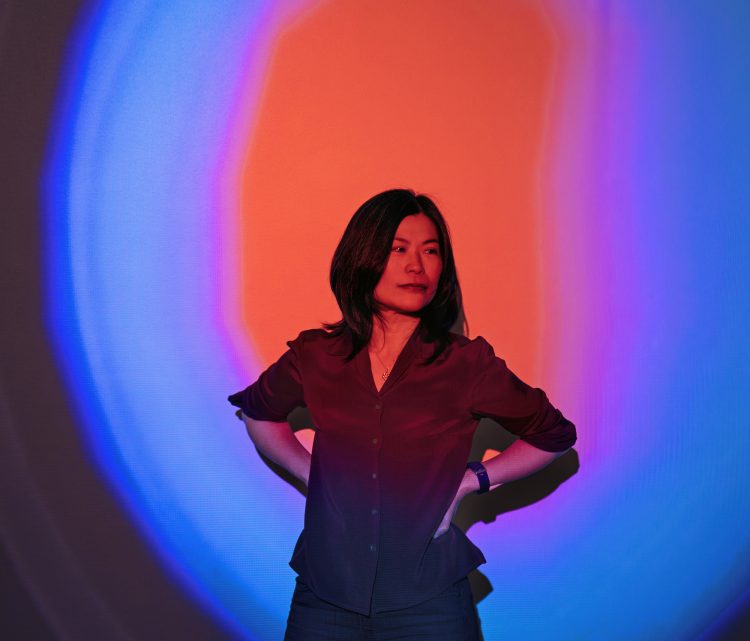
Suzie Pun, a professor in the Department of Bioengineering, received the 2018 Marsha L. Landolt Distinguished Graduate Mentor Award.
As we sit down, Professor Pun looks at me intently, in a let’s-get-down-to-business sort of way. I guess I should start. I ask about her research. She picks up a Ziploc bag and a coffee cup lid from her desk. “Do you know what plastics are?” she asks, which sounds like a trick question. “We work with plastic materials, but in the human body. We’re making plastics for biomedical applications: targeting cancer for drug delivery, making materials that mimic clots to stop bleeding, even changing gene expression in the brain.”
I tell her that I’m thinking about grad school, maybe in law or political science or even anthropology. As I say those words, I realize how all-over-the-map my future sounds. She says it’s not a big deal. “The number one thing you need to do is try it first. Volunteer, or do research, or follow a lawyer for a day. I think you can tell within three to six months if it’s something you’re going to love or not. A tiny bit of investment can save you years of your life.” I ask her how many letters of recommendation I’ll need. She says not to worry about that yet. She tells me to remember to call my mom tonight, since I forgot to last night.
Now I’m heading to my final stop of the day. It’s another grad school thing. The other day I ran into Ekin Yasin, who taught my Intro to Communication class last year. I told her I’m thinking about grad school and she invited me to sit in on a master’s class she teaches, called Narrative and Networks in Digital Media. The class is only once a week, so it’s 6 to 9:50 p.m., and I have to be back on campus at 9 a.m. tomorrow for class in Kane. I can’t even think about that, it makes my head hurt.
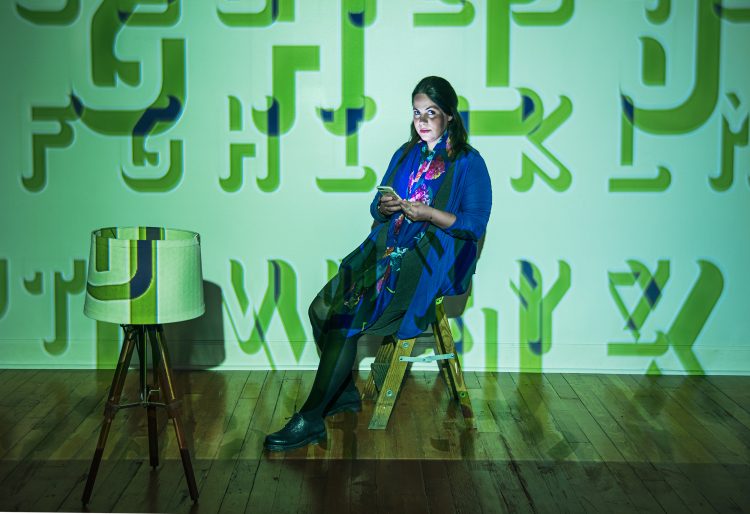
Ekin Yasin, associate director of the Communication Leadership program.
Professor Yasin starts class by talking about diversity policies. “How can a company show its customers, and the public, that these things matter to them?” she asks. When Professor Yasin gives examples, they’re not just about big American companies. It’s stuff from all over the world. She says she does that because she was an international student, from Turkey, and she knows what it’s like to miss out on cultural references from a professor. “I remember looking up ’80s movie references and spending my weekends just watching old shows that people were referencing,” she tells me. “That was on top of the course content, just so I could be included in the conversation.”
I never thought about studying communication, because I’m not good at writing, but this class is really fun.It’s almost 10 and I’m starting to crash. I’ll walk home up 15th and turn onto 45th so I can stay under the streetlights. What’s crazy is that I’ve been thinking about getting a job. Now I can’t imagine adding that to my schedule. I really need some extra money, though. Not just for fun—for like food and books and coffee. I don’t even know how much money I have right now because I’m too scared to look at my account. I think I just need to ask my mom for some more. Yeah, I’ll do that. But she’s probably asleep, so I’ll call her tomorrow.